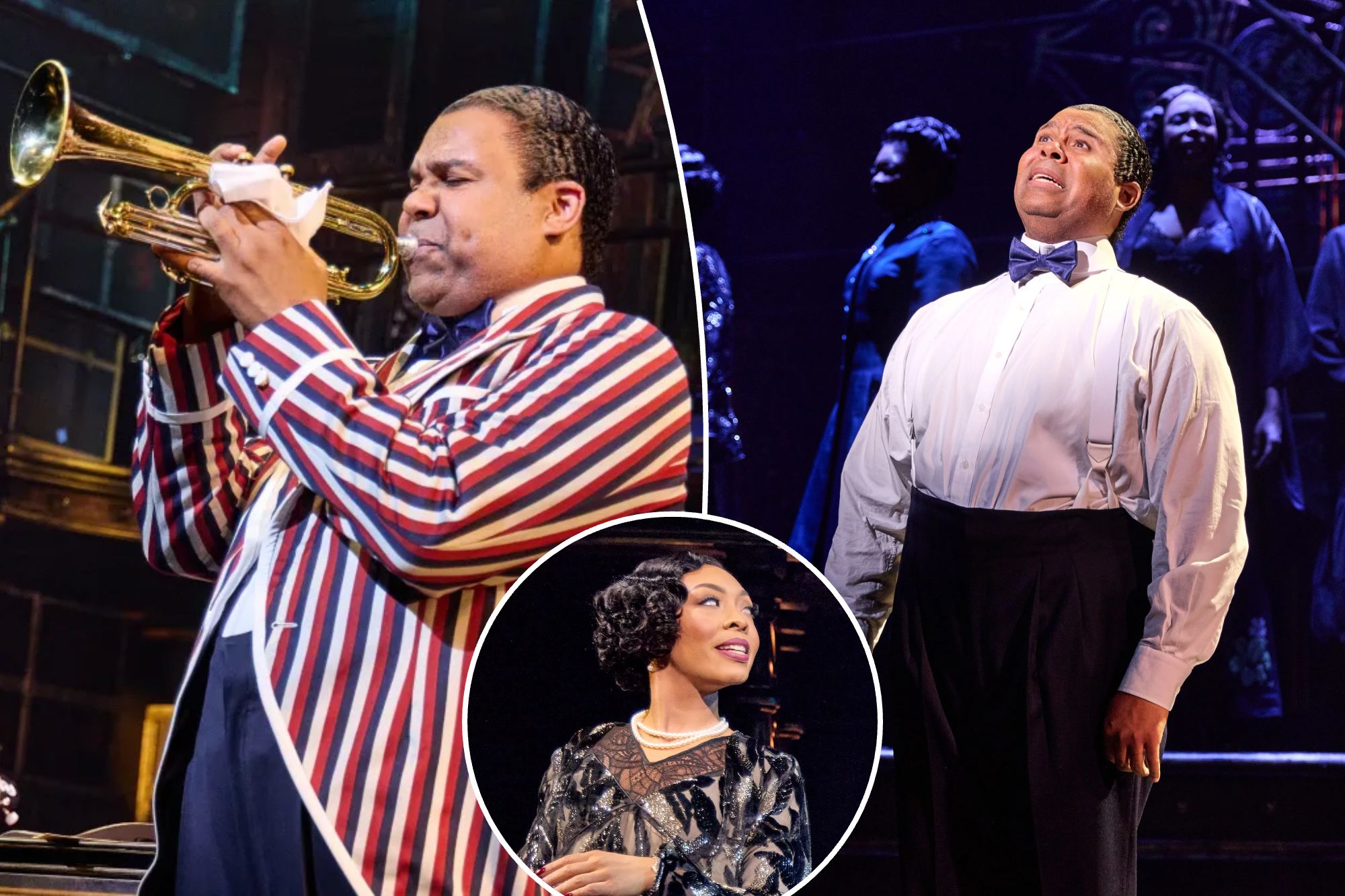
Theater review
A WONDERFUL WORLD: THE LOUIS ARMSTRONG MUSICAL
Two hours and 45 minutes, with one intermission. At Studio 54, 254 W. 54th St.
Come for the music in “A Wonderful World: The Louis Armstrong Musical,” the Satchmo show that opened Monday night at Studio 54.
As for the throaty crooner’s life story, read a book instead. What’s on Broadway is largely a deflating and cobbled-together wife story that fails to capture Armstrong, the artist.
The “Hello, Dolly!” singer, who died in 1971, indeed married four times and was a cheating jerk to that quartet of women.
His turbulent relationships with them as his fame skyrockets — from second trumpet in King Joe Oliver’s (Gavin Gregory) jazz band to Hollywood icon — punctuate “A Wonderful World.”
That’s personally messy, yes, but it’s a theatrically tricky choice by book writer Aurin Squire to center a musical filled with many, many (did I say many?) upbeat tunes around spousal quarrels and infidelity.
The show’s best numbers actually belong to the actresses who play the wives, each one fabulous.
Think of it like “Nine” or “Six” — but “Four.”
Armstrong’s ladies are Daisy Parker (Dionne Figgins), a “switchblade hooker”; practical piano player and manager Lil Hardin (Jennie Harney-Fleming); fan Alpha Smith (Kim Exum); and Cotton Club singer Lucille Wilson (Darlesia Cearcy), who finally holds him accountable for his zipper.
Their personalities are as distinctive as their knockout voices. The first act ends stunningly when spurned exes Daisy and Lil duet on “Some of These Days”/ “After You’ve Gone” — the show’s most blood-pumping auditory moment.
Cearcy has another standout in the second half with the moving “That’s My Home.”
The trouble is that Satchmo is not only second trumpet, but he’s reduced to being second fiddle. In his own show!
We’re left with the impression that the creators did not find Armstrong, emptily impersonated by James Monroe Iglehart, to be a particularly interesting guy. So, they made his significant others more significant.
Even so, the musical spans 60 years of events — from his 1910s New Orleans beginnings to a Prohibition-era stint in Chicago to film stardom in 1930s California and, finally, New York City.
While Adam Koch and Steven Royal’s set, with a Bourbon Street balcony, consistently evokes Louisiana, the terrific and malleable ensemble’s fiery dance and movement (by Rickey Tripp) help relocate the action around the country.
Besides love and lust, what drives Armstrong to the road is the ever-present ugliness of racism. A member of his band, Banjo Ben (Renell Taylor, an excellent dancer), is wrongly called a thief and killed in New Orleans early on. That traumatic memory haunts him forever.
And, even when he’s an in-demand actor on movie sets, directors spout off insensitive remarks while aggressively pushing him to smile big.
“That’s what you do!” one dismissively says.
But these scenes that go beyond clunky biographic exposition are short-lived. Just when we’re starting to explore the depths of the man, another song begins. Some, like “Black and Blue,” contribute meaning and texture; others fill time in a show that already drags.
Even though every single tune sounds sublime, the applause dims as the performance goes on. There is often a collective feeling of: “That should have been cut.”
Iglehart does well with Armstrong’s signature gravelly voice. He does not, however, add up his recognizable traits into a believable person. The actor, who played the Genie in “Aladdin,” falls back on sitcom one-liners and mugging at the crowd to wring out a response. As Iglehart grabs for laughs, he does not grab our hearts.
Armstrong argues to his manager and wife that he’s more than just the happy act he puts on for the public. The show and its lead suggest the exact opposite.
That the musical doesn’t gel is no shock. The Playbill tells a tragic tale of too many cooks. The musical is directed by Christopher Renshaw,and co-directed by Iglehart and Christina Sajous. Practically a Roman triumvirate. That many voices leave the staging with no discernible style or point of view, and makes hard decisions even harder.
And I think to myself … that’s too many directors.














